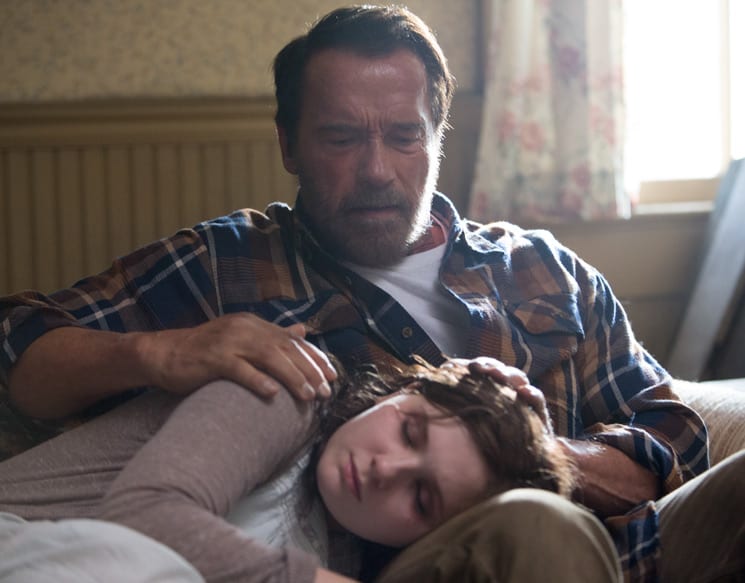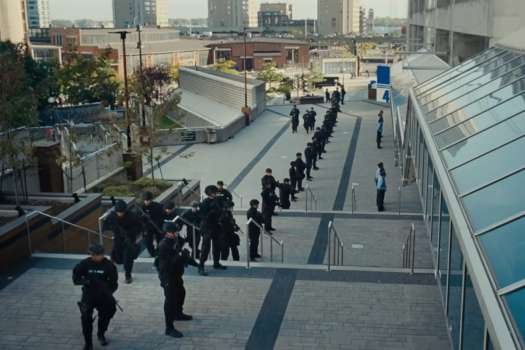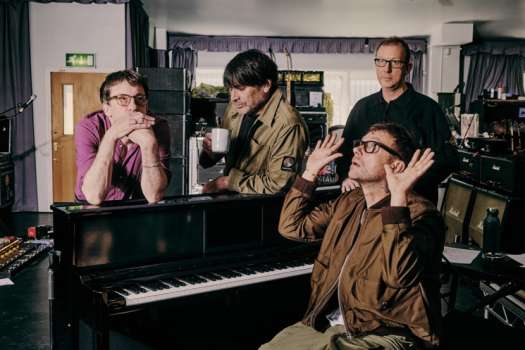Henry Hobson, whose background is primarily in title design, has crafted an unusual feature directorial debut. Maggie, which is, in simplified terms, an Arnold Schwarzenegger zombie movie, is not what such a description would suggest it to be. It premiered at Tribeca with little acknowledgement or buzz, and has received very little promotional push. For what should, in theory, be a moderately bankable film — Schwarzenegger's recent return to the big screen has some pull and zombies are still quite du rigueur — the sort of peripheral indie treatment it's receiving suggests that it's either awful or too abstract to appeal to conventional audiences. Fortunately, the latter is mostly the case.
Maggie opens with voiceovers and montages. Through voicemail messages and general geographic imagery, we understand that the titular Maggie (Abigail Breslin) has been infected with a virus plaguing the nation. While she lives in the city, which has devolved into a dangerous military zone, her father Wade (Schwarzenegger) lives in the country with his second wife Caroline (Joely Richardson) and two younger children. The policy is that the infected are allowed to return home to spend out their final days — a few weeks until the virus devolves into cannibalistic, animalistic impulse — with family under a strict, monitored regimen, wherein medical professionals check the progress and decide when they should be shipped off to a quarantine encampment.
The process of zombification and the behaviours of the infected aren't exactly conventional. Even when those bitten get past the point of civilized obedience, they're still technically alive. Death is still a finality, which, contextually, grounds the narrative within a slightly more plausible reality than the usual living dead structure; Maggie is a movie about illness and death. Though social commentary is present, the preoccupation here is what it means to confront death and what it feels like to watch a loved one deteriorate to the point where humanity and dignity are stripped from them.
In this, Hobson is highly successful. When Maggie returns home, she's sullen and distanced. She's appreciative of her father's care and not hyperbolically angst-ridden, but she's still going through the process of shock and grief. What's particularly insightful about this treatment of illness is how Maggie hides her pain and her symptoms. Though everyone can see the virus spreading on her body, she downplays just how much pain she's in and how traumatized she really is; she wants to make it as easy on those around her as she can.
Breslin, who continues to demonstrate surprising depth in her post-Little Miss Sunshine roles, manages to hold the emotional centre of the film together. She's quite convincing here in assessing the balance between quotidian normalcy and moments of panic and devastation. This isn't a melodramatic film; it's a contemplative, meditative look at the banality and quiet devastation of impending death.
The problem is mainly this: Schwarzenegger can't act. Fortunately, most of the weight here is on Breslin, but whenever he's given emotional dialogue, it falls flat and feels very scripted. His character is actually written quite well on the page, but he just doesn't have enough range to pull it off, which leaves key scenes feeling a tad forced and awkward, even though the direction, tone, pacing and basic structure all succeed as intended.
Something else that's problematic is the implied politics of the film. The basic idea here is that the big city is a barren wasteland of disease where children go to be anonymous and contract illness. There are kids in the farming community where Wade lives that have contracted the disease, but it's rare and discussed only in hushed voices. Here, there's some implication that disease and death exist where the traditional family unit fails and breaks apart, which is a rather dangerous, conservative assertion that reifies basic conventional fears of people infected with metaphorically similar illnesses like HIV.
Smartly, Hobson is conscious that this is, in a way, a queer film. These conservative values are there, but the fear-mongering rhetoric spreading about the infected is sort of a secondary dialogue spewed by the ignorant; the discussion here is more about how to handle disease prevention versus how to handle humanity. While it would be practical to simply euthanize those infected to prevent the spread, there are far more complex things to consider when those that are sick aren't contagious without blood interaction. It's a challenging dialogue that makes what proves to be a rather contemplative and heartbreaking movie far more socially conscious and intelligence than it initially proves to be.
In a way, Maggie is the deliberately paced art film that no one assumed Schwarzenegger would ever make. It's just a shame that its only downfall is his basic inability to act.
(VVS Films)Maggie opens with voiceovers and montages. Through voicemail messages and general geographic imagery, we understand that the titular Maggie (Abigail Breslin) has been infected with a virus plaguing the nation. While she lives in the city, which has devolved into a dangerous military zone, her father Wade (Schwarzenegger) lives in the country with his second wife Caroline (Joely Richardson) and two younger children. The policy is that the infected are allowed to return home to spend out their final days — a few weeks until the virus devolves into cannibalistic, animalistic impulse — with family under a strict, monitored regimen, wherein medical professionals check the progress and decide when they should be shipped off to a quarantine encampment.
The process of zombification and the behaviours of the infected aren't exactly conventional. Even when those bitten get past the point of civilized obedience, they're still technically alive. Death is still a finality, which, contextually, grounds the narrative within a slightly more plausible reality than the usual living dead structure; Maggie is a movie about illness and death. Though social commentary is present, the preoccupation here is what it means to confront death and what it feels like to watch a loved one deteriorate to the point where humanity and dignity are stripped from them.
In this, Hobson is highly successful. When Maggie returns home, she's sullen and distanced. She's appreciative of her father's care and not hyperbolically angst-ridden, but she's still going through the process of shock and grief. What's particularly insightful about this treatment of illness is how Maggie hides her pain and her symptoms. Though everyone can see the virus spreading on her body, she downplays just how much pain she's in and how traumatized she really is; she wants to make it as easy on those around her as she can.
Breslin, who continues to demonstrate surprising depth in her post-Little Miss Sunshine roles, manages to hold the emotional centre of the film together. She's quite convincing here in assessing the balance between quotidian normalcy and moments of panic and devastation. This isn't a melodramatic film; it's a contemplative, meditative look at the banality and quiet devastation of impending death.
The problem is mainly this: Schwarzenegger can't act. Fortunately, most of the weight here is on Breslin, but whenever he's given emotional dialogue, it falls flat and feels very scripted. His character is actually written quite well on the page, but he just doesn't have enough range to pull it off, which leaves key scenes feeling a tad forced and awkward, even though the direction, tone, pacing and basic structure all succeed as intended.
Something else that's problematic is the implied politics of the film. The basic idea here is that the big city is a barren wasteland of disease where children go to be anonymous and contract illness. There are kids in the farming community where Wade lives that have contracted the disease, but it's rare and discussed only in hushed voices. Here, there's some implication that disease and death exist where the traditional family unit fails and breaks apart, which is a rather dangerous, conservative assertion that reifies basic conventional fears of people infected with metaphorically similar illnesses like HIV.
Smartly, Hobson is conscious that this is, in a way, a queer film. These conservative values are there, but the fear-mongering rhetoric spreading about the infected is sort of a secondary dialogue spewed by the ignorant; the discussion here is more about how to handle disease prevention versus how to handle humanity. While it would be practical to simply euthanize those infected to prevent the spread, there are far more complex things to consider when those that are sick aren't contagious without blood interaction. It's a challenging dialogue that makes what proves to be a rather contemplative and heartbreaking movie far more socially conscious and intelligence than it initially proves to be.
In a way, Maggie is the deliberately paced art film that no one assumed Schwarzenegger would ever make. It's just a shame that its only downfall is his basic inability to act.




